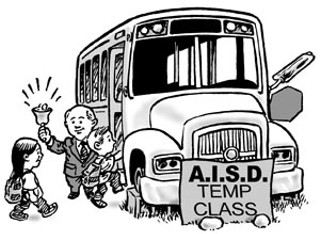Lege Wrap-Up
Education
Fri., June 3, 2005

Schools or Tax Cuts? They're Still Thinking …
This comes as no surprise, but legislators cleared out of the Capitol on Monday without a solution for funding education. They couldn't agree on school finance because they couldn't agree on which group of people to stick with the tax bill to make up for reduced property taxes. In other words, they spent more time wringing their hands over tax cuts than trying to scrounge up money to pay for public education. Something's gotta give. The House and Senate each managed to pass their own versions of school finance and tax plans (HB 2 and 3), but leaders on both sides just couldn't seal a deal at the negotiating table. The cross-Capitol rivals spent the last days of the session insisting they were "close" to an agreement, but alas, they weren't playing horseshoes.
The longer the "negotiations" dragged out, the worse things got. When the team captains – House Speaker Tom Craddick and Lt. Gov. David Dewhurst – started sending out finger-pointing press statements, it was clear they weren't even close to "close." As the curtain rang down, on Tuesday the governor called on "the people" to start raising hell with their representatives. The idea is that if enough folks complain, legislators will be inspired to forge an agreement and pass said legislation in a special session – before the Supreme Court takes up school finance on July 6. Perry neither accepted blame nor accused legislators of failure. Instead, he took a swipe at the "special interests that worked overtime against education reform and property tax relief." By "special interests," he's apparently referring to the thousands of public school teachers, superintendents, administrators, PTA groups, and voucher opponents who absolutely loathed the House education plan (praised by the business lobby), and had only a little more enthusiasm for the Senate proposal. – Amy Smith
Schools and Universities – Lip Service and Slim Pickings
Vouchers loomed large over the session this year, as the folks who like the idea of spending public education dollars on private school tuition entered the session geared up for their biggest push in years; opponents, meanwhile, were ready to play defense with their long-standing plea that the idea simply sucks money from already-strapped schools. The three bills originally proposed – one of which would have given every child in Texas $5,500 to spend on private school tuition – never made it on their own merits, but the language of one ended up amended to the bill reauthorizing the Texas Education Agency, which was up for its sunset review. After a five-hour debate described by the anti-voucher crowd as "better than anything on TV," the bill was hacked to death by a series of amendments, the coup de grace of which would have instituted vouchers in the home districts of two of the House's biggest voucher advocates, Arlington's Kent Grusendorf and Irving's Linda Harper Brown.
(Last week's "On the Lege" ["The Voucher Death Dance"] incorrectly reported that a proposed amendment, co-sponsored by Austin GOP Rep. Todd Baxter, would have spared rural school districts from the financial costs of a "pilot" school voucher program in large urban school districts. In fact, the amendment would have spared all nonparticipating school districts from the siphoning effects of the program – except for the eight stuck with the $600 million price tag. Baxter had also authored an amendment that sought to pull AISD out of the eight targeted for the experiment. The entire voucher proposal died before either amendment came up for debate.)
Even without vouchers, public school advocates still came out of the session feeling squeezed. At a time when No Child Left Behind is calling for a "highly qualified teacher" in every classroom, teacher groups complain the budget is poised to make the profession less inviting through flat salaries and declining benefits. Despite talk of a raise for teachers and a restoration of the $1,000 health care stipend cut last session, such provisions died along with the school finance bill (as did overdue funding for new textbooks). Instead, teachers are leaving the session with yet another benefit cut – this time to pensions.
In higher ed, one of the more contentious debates was over the potential capping or elimination of the Top Ten Percent program, which guarantees top-ranking high school seniors admission to the UT institution of their choice. While even the plan's supporters admit that it creates problems for UT-Austin – more than two-thirds of UT's entering freshmen are admitted under the plan, which leaves little room for more "holistic" measures – they worried that simply capping the number of students who could be admitted under the plan would be unfair to high schoolers who studied hard, made the top 10%, and then got bumped because of space. In the end, all efforts to change the law failed.
College students also claimed a victory with the passage of a bill allowing a student to serve on the board of regents, even if the "student regent" won't have voting power. Students also hoped to put a stop to the "runaway tuition" ushered in by tuition deregulation, which passed in 2003 and prompted tuition increases at UT-Austin of nearly 40%. The Senate passed a bill that would require a committee to study the effects of tuition deregulation, and that would phase out the law in 2007 if the Lege did not vote to continue it – but the bill never made it through the House. – Rachel Proctor May
Got something to say on the subject? Send a letter to the editor.






